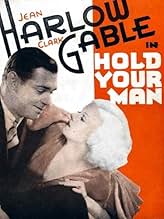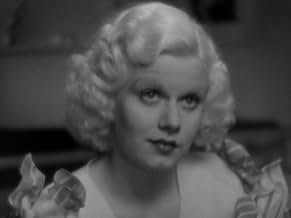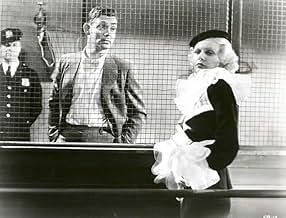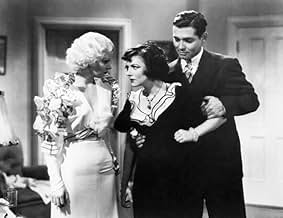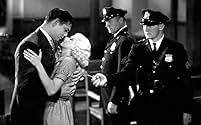Agrega una trama en tu idiomaA woman is sent to a reformatory when her con artist lover flees after killing a man during a botched blackmail scheme.A woman is sent to a reformatory when her con artist lover flees after killing a man during a botched blackmail scheme.A woman is sent to a reformatory when her con artist lover flees after killing a man during a botched blackmail scheme.
- Dirección
- Guionistas
- Elenco
- Premios
- 2 premios ganados en total
Louise Beavers
- Elite Club Attendant
- (sin créditos)
Wade Boteler
- Police Sergeant at Reformatory
- (sin créditos)
Bobby Caldwell
- Ruby & Eddie's Son
- (sin créditos)
Nora Cecil
- Miss Campbell
- (sin créditos)
Jack Cheatham
- Policeman
- (sin créditos)
G. Pat Collins
- Phil Dunn
- (sin créditos)
Nell Craig
- Miss Willard - Reformatory Matron
- (sin créditos)
Opiniones destacadas
I always loved Rita Hayworth and Ava Gardner, but not so much Jean Harlow. Me = dumb. I'd only seen clips of her films here and there. I always thought she was a hot one-liner, a glamour girl. But after seeing this, my first full length Jean Harlow experience, I admit that Miss Harlow was a truly great screen artist with the gift of creating rich characters. I simply fell in love with her, not because she was the first blonde bombshell or because she died young and became a legend. In this film, Miss Harlow's character is multi-dimensional beyond the traditional 1930's moll. She starts out one place and travels an arduous journey to end up on the other side of life. I loved her tough exterior. I loved her smile. I loved her song at the piano. My God, she was stupendous, she made me burst into tears when she sang her sad song. Most of all, I loved the HAPPY ENDING, Hollywood style. One other thing I was thrilled about was the African American inmate and her preacher father. Anita Loos was SO ahead of her time. She wrote 2 characters who were so lovely and so real. The inmate girl and her father brought such harmony to their scenes with all the white folk. A REVELATION for me. I hate stereotypes.
Jean Harlow and Clark Gable star in "Hold Your Man," a film from 1933.
Gable plays con man Eddie Hall who runs into the apartment of Ruby Adams (Harlow) as he races to escape from the police. She's taking a bath and isn't happy having a strange man in her apartment. But Ruby has no problem taking care of herself.
Though she is dating a sturdy businessman (Stu Erwin) whom she attempts to con for her rent money, Ruby falls for Eddie. She falls for him so hard that she helps him with a con and winds up in prison. One day she gets dizzy. Well, we know what that means. But Eddie hasn't been in touch. Then, one day, she gets word of him from an unlikely person.
The highlight of this film is the snappy dialogue and the wonderful Harlow who, when she's offered a look at Gable's bedroom says, "Send me a picture of it." There was criticism here that when she went into prison, her personality changed, but I disagree. It's obvious in the beginning that she's interested in Eddie, and why wouldn't a woman in love, in prison, and pregnant, show vulnerability? That was the great thing about Harlow - underneath the street-smart wise cracks, there was a sensitivity.
Gable had been ascending the Hollywood ladder by leaps and bounds, and he is delightful here. Both he and Harlow play characters who put up a front, but ultimately their defenses come down.
I enjoyed it.
Gable plays con man Eddie Hall who runs into the apartment of Ruby Adams (Harlow) as he races to escape from the police. She's taking a bath and isn't happy having a strange man in her apartment. But Ruby has no problem taking care of herself.
Though she is dating a sturdy businessman (Stu Erwin) whom she attempts to con for her rent money, Ruby falls for Eddie. She falls for him so hard that she helps him with a con and winds up in prison. One day she gets dizzy. Well, we know what that means. But Eddie hasn't been in touch. Then, one day, she gets word of him from an unlikely person.
The highlight of this film is the snappy dialogue and the wonderful Harlow who, when she's offered a look at Gable's bedroom says, "Send me a picture of it." There was criticism here that when she went into prison, her personality changed, but I disagree. It's obvious in the beginning that she's interested in Eddie, and why wouldn't a woman in love, in prison, and pregnant, show vulnerability? That was the great thing about Harlow - underneath the street-smart wise cracks, there was a sensitivity.
Gable had been ascending the Hollywood ladder by leaps and bounds, and he is delightful here. Both he and Harlow play characters who put up a front, but ultimately their defenses come down.
I enjoyed it.
This pre-Code box office success pairs Clark Gable with Jean Harlow. Gable plays Eddie, a purveyor of the short con who, after taking advantage of his mark (or his women) quickly moves on. Harlow is Ruby, a platinum blond with common tastes who gets around and knows how to handle herself. She's the wiser of the two and she knows the odds are stacked against Eddie due to his criminal myopia.
After Eddie does a stint in jail, their relationship changes, but the consequences of past crimes derail the couple. Some reviewers have said that the film changes tone at this point and suffers from the change in focus. But this is when the viewer realizes this is Ruby's story. Eddie is the one who goes through the greatest transformation, but the tale is told from Ruby's point of view and we follow her ordeals.
Fortunately, Ms. Harlow is up to the challenge, delivering a touching performance that is multi-dimensional and deeply touching.
After Eddie does a stint in jail, their relationship changes, but the consequences of past crimes derail the couple. Some reviewers have said that the film changes tone at this point and suffers from the change in focus. But this is when the viewer realizes this is Ruby's story. Eddie is the one who goes through the greatest transformation, but the tale is told from Ruby's point of view and we follow her ordeals.
Fortunately, Ms. Harlow is up to the challenge, delivering a touching performance that is multi-dimensional and deeply touching.
Love conquers all. That includes reality as defined in this pre-Code tearjerker. I would sympathize with the moral if the end weren't exaggerated into such a pile of mush. As others point out, the first half is sprightly as Gable and Harlow work the shady side of life. But then Gable accidentally kills a guy, while Harlow gets nabbed for a con job. So it's off to the hoosegow for both. Actually Gable drops out, while we follow Harlow's jaunt in a military- type slammer for women. Babes behind bars it ain't. The girls get to wear shapeless smocks, presided over by a bunch of long black crows (Patterson, et al.). One thing this segment proves—women can march from here to there in lockstep as well as men.
Some pre-Code highlights—Harlow in a gown unruffled by underwear; an actual socialist loudly denouncing the "system"; an unmarried Harlow with-child after an undisguised night with Gable; a peek-a-boo with Harlow in the bathtub. And though it's not pre-Code, the black minister and his inmate daughter rise above stereotype of the day. In fact, Theresa Harris is so winning as daughter Lillie Mae, she nearly steals the show. I can see why she had such a long career, even if mainly as menials.
The movie's a good look at MGM's golden twosome in their prime. And if the material falters, the stars manage to shine. So fans should be happy, despite the soggy ending.
Some pre-Code highlights—Harlow in a gown unruffled by underwear; an actual socialist loudly denouncing the "system"; an unmarried Harlow with-child after an undisguised night with Gable; a peek-a-boo with Harlow in the bathtub. And though it's not pre-Code, the black minister and his inmate daughter rise above stereotype of the day. In fact, Theresa Harris is so winning as daughter Lillie Mae, she nearly steals the show. I can see why she had such a long career, even if mainly as menials.
The movie's a good look at MGM's golden twosome in their prime. And if the material falters, the stars manage to shine. So fans should be happy, despite the soggy ending.
One of the great mysteries of life, suffered from daily, is why nice girls so often are more interested in the jerks and heels than in the nice guys.
Worse, when the nice guys even want to marry those girls, the girls STILL prefer the jerks and heels, even after the jerks and heels have shown their contempt, have shown they're just interested in using the girls.
Stu Erwin is the nice guy, who continues to be nice after being lied to and cheated and even after losing the girl completely.
Clark Gable is the jerk, and he is perfect in the role, rather a sad note to his fans.
Jean Harlow comes across as a more slender Mae West, even sounding like La West in some of her cynical throwaway lines.
Somewhat puzzling is that so many of the other characters, intended to be bad guys -- I mean, heck, they're locked up, so they must be -- are so obviously nice people.
In fact, there are lots of nice people here, people who, in a lesser film or story, would be snarling and back-stabbing but here go out of their way to help someone else.
So, maybe the story is rather clichéd, at least by modern standards, but ultimately the viewer will be glad to have watched.
The biggest complaint I have is that so many really good actors are not given credit. Once again, we can say a fervent "Thank You" to IMDb.com.
Worse, when the nice guys even want to marry those girls, the girls STILL prefer the jerks and heels, even after the jerks and heels have shown their contempt, have shown they're just interested in using the girls.
Stu Erwin is the nice guy, who continues to be nice after being lied to and cheated and even after losing the girl completely.
Clark Gable is the jerk, and he is perfect in the role, rather a sad note to his fans.
Jean Harlow comes across as a more slender Mae West, even sounding like La West in some of her cynical throwaway lines.
Somewhat puzzling is that so many of the other characters, intended to be bad guys -- I mean, heck, they're locked up, so they must be -- are so obviously nice people.
In fact, there are lots of nice people here, people who, in a lesser film or story, would be snarling and back-stabbing but here go out of their way to help someone else.
So, maybe the story is rather clichéd, at least by modern standards, but ultimately the viewer will be glad to have watched.
The biggest complaint I have is that so many really good actors are not given credit. Once again, we can say a fervent "Thank You" to IMDb.com.
¿Sabías que…?
- TriviaWhen Eddie is looking around Ruby's apartment, waiting for his clothes to dry, he spots a pennant on the wall that says "Albany Night Boat." That refers to the steamships that would depart New York City in the early evening for an overnight trip up the Hudson River to Albany. The ships had hundreds of staterooms and often were used---as the film's contemporary audience would know---for romantic getaways or illicit affairs. The pillow Eddie sees next also may have been a souvenir from the ship, as it's inscribed, "We're here to-day/To-morrow we're through/So let's be gay/It is up to you." Such trips peaked in the early 20th century, but started to decline in the 1930s when less costly, speedier, and more efficient modes of transportation by rail and automobile came to the fore. By the 1940s, the Albany Night Boat had virtually ceased to exist.
- ErroresWhen Eddie slams the door after tossing Aubrey Mitchell out of the apartment, the wall shakes.
- ConexionesFeatured in Polvorilla (1933)
- Bandas sonorasHold Your Man
(1933) (uncredited)
Music by Nacio Herb Brown
Lyrics by Arthur Freed
Played on a record and sung by Harriet Lee
Reprised by Jean Harlow, playing piano and singing
Selecciones populares
Inicia sesión para calificar y agrega a la lista de videos para obtener recomendaciones personalizadas
- How long is Hold Your Man?Con tecnología de Alexa
Detalles
Taquilla
- Presupuesto
- USD 266,000 (estimado)
- Tiempo de ejecución1 hora 27 minutos
- Color
- Relación de aspecto
- 1.37 : 1
Contribuir a esta página
Sugiere una edición o agrega el contenido que falta

Principales brechas de datos
By what name was Hold Your Man (1933) officially released in India in English?
Responda

